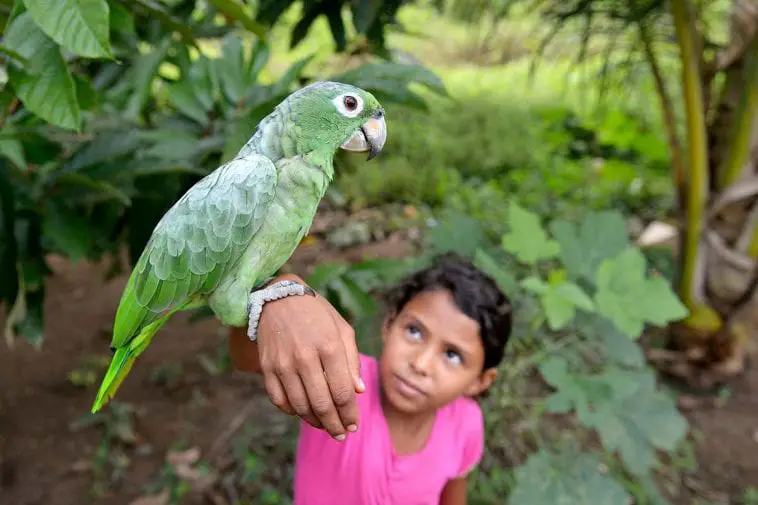Parrots are known to be one of the most intelligent and interactive pets. These animals are sensitive, easy to care for, and will love you forever when you care for it properly. However, parrots are not free from quirks. These pets may also have some off days, which can surprise first-time owners. If this is your first time to take a parrot as a pet or you’re planning to do so the next days, read our guide on the dos and don’ts of living with a pet parrot. These tips will help you understand these birds better and will help you plan your next move in getting a parrot as a pet.
Dos in getting a parrot as a pet
Parrots should be handled early
Just like other pets, parrots need to establish trust with you as its owner. Parrots that are taken from the wild or a pet shop may still be wary of contact, and early handling is the key to establish trust. So how do you go about this?
First, never over-smother your pet with attention. Parrots are not like dogs and will prefer it if you leave it alone some times. But you can try creating trust by first letting it out from its cage and letting it peck some food from your hand.
Let it eat food on your hand and let it be comfortable as it soon cleans itself and tries to sleep. You can now pet it and pat it on the head. If you can repeat this exercise for the next few days, then congratulations, you have finally established trust. Do this early, as much as possible the week you get this home.
You must have a lot of patience for this exercise, and also, you must have irresistible treats nearby so it will associate your handling with special treats.
Parrots must have a companion
Parrots are social animals and will prefer to have a companion. If you overlook this, your pet can become withdrawn, depressed, and may suffer from some health issues due to its unhappy state. You can get him a girl or a mate or a group of males and females.
But be extra careful before you place a new friend inside the cage. Aside from stressing your pet, you are also stressing the newcomer. So for this exercise, introduce the two slowly. Use two separate cages and place the cage side by side. Let the two see each other but can’t reach out or grab each other first.
Interact with each pet separately and make sure to feed them at the same time. When you sense aggression like the flapping of the weeks, preening, squawking, and other unnecessary noises, remove the newcomer. Introduce the two again the next day. Eventually, your pet will consider this new bird a friend and may now be placed inside its cage.
Take note; the cage must be large enough to fit two parrots. It must accommodate the bird with the wings outstretched without touching the sides of the cage. Also, it’s better to quarantine a new pet to be sure it’s not carrying any illness or any pests. Quarantine for at least a month to rule out diseases and then let the two meet again.
Parrots must be fed with good, healthy and organic food
So instead of getting your pet parrot food from the pet shop, you may have to visit a local grocery store for organic healthy food. Create a varied diet for your pet, which includes fruits, vegetables, nuts, seeds, sprouts, and more.
Parrots that are being trained are often given treats, and although there’s nothing wrong with this, it would be better if you give your pet natural treats. So instead of a commercially-prepared bird treat with chemicals and preservatives, give your pet fruits, veggies, and nuts, seeds, and pasta or popcorn.
You can also grow your food for your family and your pet. This ensures that you are giving your pet safe, toxin-free, chemical-free food daily.
Parrots love human interaction
Although parrots would love to socialize with birds of the same species or other birds, it won’t resist engaging his human owners in conversations. Some pet owners were amazed as to their pet’s amazing ability to talk and to respond to human interaction. Some would call their owners by name, ask for food, or may make some noise or any non-verbal cues to communicate.
Consider that some parrots can talk and make sounds, which could be a wonderful thing to consider for owners, but some species are unable to make any sounds. But this does not mean that there’s no use of the non-verbal species.
You can still train your bird different tricks and even to mimic sounds if it cannot speak human words. Parrots are naturally smart, and with proper training, you can teach your pet how to speak and develop its vocabulary. You can even help it perform in front of an audience to do amazing tricks.
Parrots and metals don’t mix
Most bird pet owners are unaware of the dangers of some metals to parrots and birds. A condition known as metal toxicity is when bits of hazardous metals remain in your pet’s body and cause terrible effects. Metal toxicity can cause vomiting, lack of appetite, weakness, loss of weight, diarrhea, and even behavioral changes. If you are not careful, your bird can die with metal toxicity.
Remember the dangerous metals like copper, lead, and zinc. Even in small amounts, these can cause terrible side effects and may even lead to poor development in small or juvenile parrots. You also have to remember safe metals like aluminum, stainless steel, nickel, iron, and any non-galvanized metals. If you are unsure of a metal toy or accessories your parrot is using, or you want to buy, don’t.
Settle with toys made of rattan, wood, or fabric instead. But remember that some painted toys like painted wooden toys may also be dangerous if the paint used on this toy contains lead. Choose vegetable paint instead so your pet can chew on the toy safely.
Parrots are always ready to be with you
You may not know also that parrots are always on the go, ready to be with you no matter where you want to go. Parrots love to socialize with their human companions, and some are also curious about how their owners move from room to room.
If your pet can’t get enough of you and would like to accompany you wherever you want to go, then it may be high time to use a leash and harness.
Similar to a leash and harness for dogs, this device gently attaches to the bird’s body, and a leash is added so your pet can fly about but not escape. You can use this leash when you want to go out with your pet. You can go to the playground, at the beach, or the mall (if this is allowed), and your pet will remain safe and sound with you.
And just like pet dogs and cats, it can take time for a pet parrot to become accustomed to a leash and harness, so you must help it wear it. First, let it wear the harness inside its cage for a few minutes. If it becomes uncomfortable, remove it. Try it again, and this time, give it some treats when it can wear it successfully. When your pet can wear a harness for an hour or more, try to attach the leash and take it out of its cage. Don’t forget to give it some treats for this good behavior.
Parrots need regular vet checkups
Just like other pets, a parrot needs regular vet checkups. As soon as you get your parrot, take it to the vet for some shots, a diet prescription, and some supplements. Also, new pets should be checked, and health conditions ruled out before it is allowed to be with your other pet birds.
Vet visit schedules are determined by your vet, and as much as possible, choose a vet that is well-versed with avian care or exotic bird care.
Parrots should get supplements
Another must for captive parrots is getting supplements. Parrots naturally get their nutrition from the natural food they eat from their surroundings. On the other hand, captive parrots may lack some of these nutrients, especially those that are used to eating commercially –prepared food. Adding supplements like calcium, magnesium, potassium, and vitamin A is important. Talk to your vet regarding supplements and how to add this to your pet’s food.
Don’ts of getting a parrot as a pet

Never use any nonstick cookware
Despite warnings from health departments, fumes that are released from overheated nonstick cookware can be toxic to birds of all species. If you have a pet parrot, never use this cookware and if you cannot avoid using this cookware, use an exhaust system in your kitchen to remove the fumes.
Nonstick coatings, just like Teflon, are also in other things as well, like heaters and hair-dryers. As a pet owner, you must be very vigilant about this. You must select cookware without these chemicals or better yet, talk directly with various companies regarding this risk.
Also, check different products in your home that contain these materials. Check your pet’s toys and accessories to make sure that these are free from these dangerous materials.
Don’t get any kind of bird if you are a neat freak
There’s no doubt that birds are messy. Even small soft-billed birds, just like canaries, may toss their food, and some may also poop anywhere. Don’t forget that birds can also shed their feathers and leave dander everywhere. You cannot avoid this even if your pet is well-behaved! So if you cannot tolerate the mess or you don’t want to handle parrot messes, then you might as well take care of other pets.
Never take a parrot if pets are not allowed in your home or apartment
People who take care of parrots into “No Pet” housing end up teaching their parrots to stay quiet every time they make a sound. But what happens is that they fail to teach their parrots how to keep quiet, and this can cause their pets to lose their homes. If you live in an apartment or building with a no-pets rule, go for quiet pets instead, like include fish and reptiles.
Don’t take home a parrot just because it can talk
A parrot that can mimic human speech or those that can mimic sounds can be amusing, but knowing how to speak will not justify how much work these pets are. Pet parrots can become very demanding if you spoil them and the worst thing is, they can make a lot of noise and ruckus that you can’t stop! So if a talking parrot is something you want, why not get a radio instead.
Don’t expect your parrot to talk
Some species of parrots can talk, but that does not mean that all parrots or birds in that species can talk because most likely, many of these individuals can’t and will never learn how. If this is very important to you, then why not consider a parrot that already talks.
However, parrots that talk in one environment may not be able to talk when placed in a strange environment. There are no guarantees, so please reconsider taking a parrot home because you just want a talking one.
Never cut corners on the price of toys, food, and cages
Pet parrots are very expensive to maintain if you think about the price of the cage, food, vet visits. But to get the best quality stuff for your pet, you must spend a sizeable amount of money. Even if you DIY your pet’s cages and make his toys, you still have to spend money on materials. Remember, some materials like metals, wood, and plastic are not for pet birds because these can be toxic to them.
Do not get a large parrot if you live in a small house or apartment
Parrots are naturally outdoors, where there are fresh air and sunshine. If you cannot give a captive parrot the space it needs, then it’s not a good idea to have one. Large parrots and very active smaller species need large enclosures, and if you don’t have space or the money to buy one, then don’t get a parrot.
Don’t take home a bird just because it is beautiful
Just like a parrot’s ability to talk, the beauty of a bird won’t counter all the responsibilities and the negative things about taking a pet parrot. A bit of smart advice: if beauty is the sole reason for wanting a bird, then just check out pictures of these birds on the web because these are much less of a problem than actual birds.
Also, don’t get a parrot species that creates a lot of powder, such as a cockatoo, an African grey parrot, or a cockatiel. The powder that they produce can cause respiratory allergies if you or any member of your family has asthma or respiratory problems. These powder-down species can also start respiratory problems even if you don’t have any allergies.
Don’t tolerate bad parrot behaviors
Never tolerate bad behavior at all costs. Some pet owners find this cute or may make fun of their pet’s bad behaviors, but this is like tolerating it and acknowledging that they can’t do anything about this. So how do you teach parrots that their behavior was not acceptable?
For example, a parrot the screeches when a stranger comes inside the home or someone new comes inside your home may seem to be cute at first, but soon, this is becoming an unacceptable and irritating behavior. You can command your parrot to stop by saying, “stop.” Once it stops screeching, give it a treat. But if you say stop and nothing happens, withhold the treat. Don’t spank, hit, spray water, or use whistles or other loud devices on your parrot.
Don’t respond to behaviors you don’t want
Most pet owners do the opposite thing. They respond when their pets perform bad behaviors and stay silent when their pets are quiet or are doing good. Just like the previous tip, reward your pet for good behavior. Talk to it, praise it or pet it if it performed tricks. IGNORE it when it tries to pull a naughty trick on you.
Just like the screeching and squawking when a new person is inside the house, don’t tolerate this and just ignore it. You may say stop and reward it as well.
Don’t get a bird if you are sensitive to noise
Parrots and other birds make a lot of noise, and if you are the type who loves silent mornings or have time to relax and contemplate, then a bird is not the pet for you. Sadly there’s no way to make a bird shut up. You don’t have to live with a talking or chirping bird if you love quiet days, so don’t start by getting a parrot.
Don’t get a parrot especially if you are struggling financially
You still need to provide a large cage even for a small bird, and this can still be expensive. You also have to consider the money you need to pay for vet check-ups, medicines, supplements, pet food, and pet furniture. Also, if your pet gets sick, you still have to pay for its treatment, and all these can cost a small fortune! So if you are not prepared financially to take a pet, then you must not force yourself.
If you are being forced by your child to get a parrot, then you don’t have to give in to his requests. Tell him you would gladly take him to the zoo or a pet center. Don’t make a promise that you’ll get him a parrot someday. He’ll understand soon that this is not a good idea because of your situation.
Don’t get a parrot if you’re already very busy
Parrots are social, and these need daily interaction, if only for a few minutes at a time, for at least several times a day. So if you don’t have the luxury of time, then you might be better off not getting a pet or a pet that does not require constant supervision. Pick a fish or a reptile; these are often better off left alone.
Do not sleep with your parrot
Sure, parrots are very cute, and you might be tempted to do everything with your new pet, but no matter what, never take your pet with you to sleep. Even with a large macaw, you can instantly smother it to death. Also, a parrot can bite you or scratch you if you are not careful when you sleep. You may end up with a bruise or a poked eye if you suddenly lean on your pet while you’re asleep.
Never do all-over petting
You may not know it, but petting your parrot too much is a form of sexual foreplay. This needs to be avoided because sexual stimulation can lead to problems or behavioral problems.
Never get a parrot if there’s one person in your home who dislikes it
Parrots can be overwhelming companions, even for people who love and care for them. And to bring such a bright and awesome animal in a home where others are not appreciative is inappropriate. How would you feel if it was the opposite? So before taking a pet parrot, or any pet for that matter, consider the opinion of everyone in the family.
Never get a parrot which can live for a very long time
Some pets like dogs and cats, and many pet parrots can live for a very long time. Take note that even a canary can live for 20 to 60s, especially when they are captive animals. Parrot species like Amazon parrots, cockatoos , and species like macaws can live for a very long time. Parrots need a long-term commitment pet owner. So if you have a parrot at home, you must teach younger members of the family how to care for it and how to train it because, in reality, you won’t be around to care for it. So why not start by not getting a parrot if you don’t have anyone to care for it when you’re gone?



